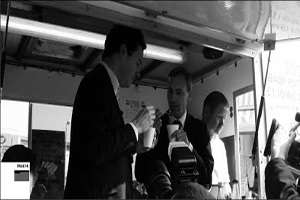THIS FRIGHTENS ME
VOTING AND THE BRITISH ELECTORAL SYSTEM.
BY FRASER BAYES.
George Osborne is 38 years old. He will take over the economy in the worst state that it has been in since the Second World War. This frightens me. The Conservative Party exist in a contradiction, on one hand they want to stop a third runway at Heathrow, on the other they would repeal the Human Rights act. They express deep convictions about major banking reform, yet in Europe they remove themselves from the CCP, the governing and most powerful block in the EU, and align themselves with far right extremists, some of whom attend Nazi remembrance marches.
The Conservative party want to portray themselves as all things to all people, yet underneath the veneer lies the same outdated modus operandi that Maggie Thatcher so balefully used to condemn a generation to the dole. Alas the Labour party has no answers; they have palpably run out of ideas. Their judicial laws are becoming more draconian, and if they win the next election it would still be a disaster for this country.
The best we can hope for is a hung parliament, which would happen if none of the parties gained enough votes to form a government. The Liberal Democrats would be key in this instance, with Sheffield MP Nick Clegg acting as a kingmaker. The Lib Dems are perpetually the bridesmaids of British politics. They average 20 percent of the public vote, but get only 63 out of 646 seats in the House of Commons. Clegg has been criticised for being a shoddy communicator, and some say this is irrelevant. Yet Britain’s greatest leaders, such as Churchill and Lloyd George, were magnificent orators. The ability to express an opinion and inspire their fellow citizens should not be underplayed. In British politics today there is a lack of such leaders, and we are all worse off for it.
Only 21% of the 44 million electors supported Labour in the 2005 general election, which shows the blatant unfairness of our current electoral system. Every MP Labour gets equates to 26,858 votes, a Tory 44,241, and for the Liberal Democrats it is a mind boggling 98,484.
Basically, 353 Labour MPs were elected on 9.48m votes, 196 Conservatives on 8.67m votes and 60 Liberal Democrats with 5.9m votes. It is embarrassing for a nation who prides itself on being a progressive democracy and invades other countries for being ‘undemocratic’. So what other voting systems are there?
Proportional representation
Proportional representation is used in the European elections. In this system you vote for a party, not a candidate. Each party nominates candidates and the seats are shared out according to vote. So if there were three seats and the Labour party won 60% of the vote and the Conservatives 30%, Labour would have two seats and the Conservatives one.
Single Transferable Vote
Single transferable vote is used in the London mayoral elections. This is a complicated beast, but offers a fairer representation for everybody: each constituency elects three to five candidates, and voters rank them: one, two and three, by preference. Candidates must win a pre-set number of votes in order to be elected (the quota). After voting, all first preferences are counted and candidates up to the first quota are deemed elected. If some seats remain vacant, then a second round of voting must take place, where elected candidates surplus votes come into play. Those voters’ second preferences are counted, boosting support for so-far unelected candidates. By the time this round is finished the quota may have been met. Additionally, the third preferences are counted to see if any quotas are met. If vacancies remain, the candidate with the lowest first-choice support drops out and their votes apply according to the next preferences. This process is continued until all seats are filled.
It would probably also produce a coalition government, a centrist moderate one that better reflected the wishes of the people, and would almost certainly feature the Liberal Democrats.
Labour claim that they will hold a referendum in 2011 if they win the election, yet they stated in their 1997 general election manifesto that they would hold a vote on proportional representation.
David Cameron came of age in Thatcher’s Britain. He is still not so far removed from that epoch of Conservatism that believed in a small and isolationist state that damaged our standing in the world; a government that fuelled the cult of the self, that led to our current economic meltdown. Make no mistake – David Cameron is a wolf in sheep’s clothing. Yet the alternative, Gordon Brown, is no better.
So the best we can hope for is a hung parliament, where Nick Clegg would come to the fore; and he should demand voting reform above all else. Write to your local MP and tell him what you think. He may soon be much more powerful than you might imagine. This is essential to modernise our democracy, so that democracy is a reality; not just a word on a page that has a hollow meaning.
